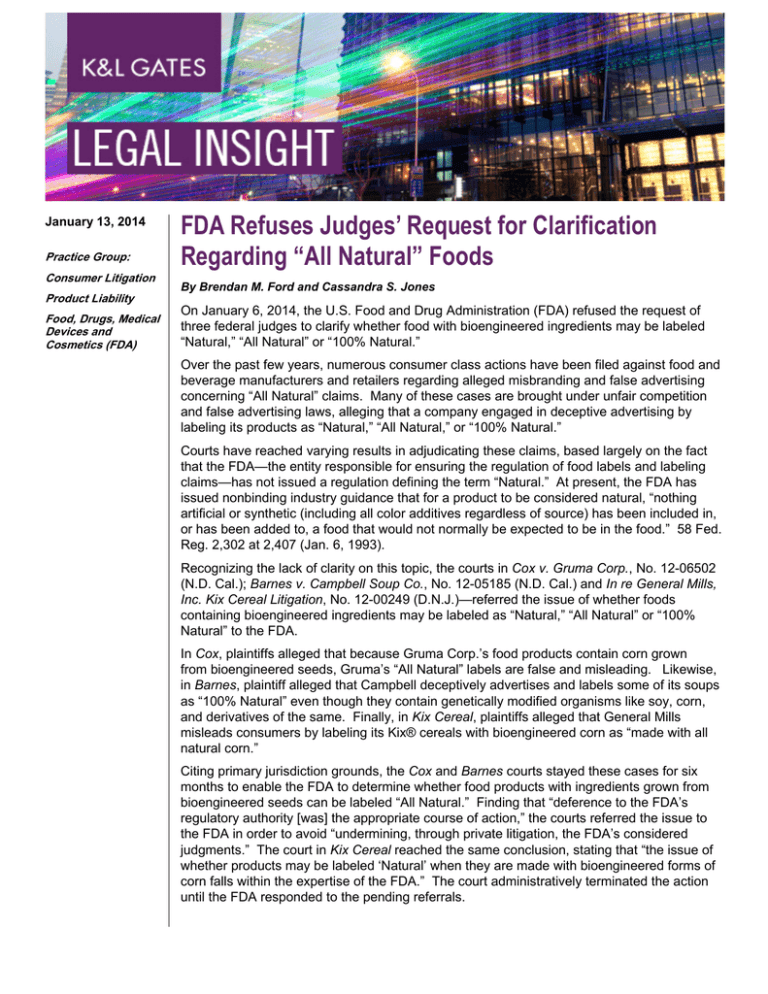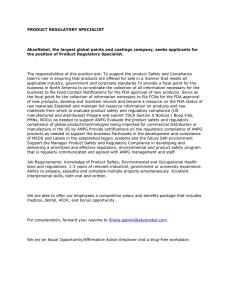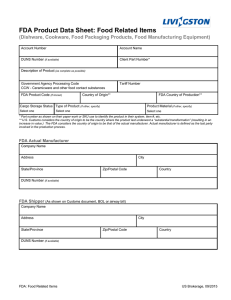
January 13, 2014
Practice Group:
Consumer Litigation
Product Liability
Food, Drugs, Medical
Devices and
Cosmetics (FDA)
FDA Refuses Judges’ Request for Clarification
Regarding “All Natural” Foods
By Brendan M. Ford and Cassandra S. Jones
On January 6, 2014, the U.S. Food and Drug Administration (FDA) refused the request of
three federal judges to clarify whether food with bioengineered ingredients may be labeled
“Natural,” “All Natural” or “100% Natural.”
Over the past few years, numerous consumer class actions have been filed against food and
beverage manufacturers and retailers regarding alleged misbranding and false advertising
concerning “All Natural” claims. Many of these cases are brought under unfair competition
and false advertising laws, alleging that a company engaged in deceptive advertising by
labeling its products as “Natural,” “All Natural,” or “100% Natural.”
Courts have reached varying results in adjudicating these claims, based largely on the fact
that the FDA—the entity responsible for ensuring the regulation of food labels and labeling
claims—has not issued a regulation defining the term “Natural.” At present, the FDA has
issued nonbinding industry guidance that for a product to be considered natural, “nothing
artificial or synthetic (including all color additives regardless of source) has been included in,
or has been added to, a food that would not normally be expected to be in the food.” 58 Fed.
Reg. 2,302 at 2,407 (Jan. 6, 1993).
Recognizing the lack of clarity on this topic, the courts in Cox v. Gruma Corp., No. 12-06502
(N.D. Cal.); Barnes v. Campbell Soup Co., No. 12-05185 (N.D. Cal.) and In re General Mills,
Inc. Kix Cereal Litigation, No. 12-00249 (D.N.J.)—referred the issue of whether foods
containing bioengineered ingredients may be labeled as “Natural,” “All Natural” or “100%
Natural” to the FDA.
In Cox, plaintiffs alleged that because Gruma Corp.’s food products contain corn grown
from bioengineered seeds, Gruma’s “All Natural” labels are false and misleading. Likewise,
in Barnes, plaintiff alleged that Campbell deceptively advertises and labels some of its soups
as “100% Natural” even though they contain genetically modified organisms like soy, corn,
and derivatives of the same. Finally, in Kix Cereal, plaintiffs alleged that General Mills
misleads consumers by labeling its Kix® cereals with bioengineered corn as “made with all
natural corn.”
Citing primary jurisdiction grounds, the Cox and Barnes courts stayed these cases for six
months to enable the FDA to determine whether food products with ingredients grown from
bioengineered seeds can be labeled “All Natural.” Finding that “deference to the FDA’s
regulatory authority [was] the appropriate course of action,” the courts referred the issue to
the FDA in order to avoid “undermining, through private litigation, the FDA’s considered
judgments.” The court in Kix Cereal reached the same conclusion, stating that “the issue of
whether products may be labeled ‘Natural’ when they are made with bioengineered forms of
corn falls within the expertise of the FDA.” The court administratively terminated the action
until the FDA responded to the pending referrals.
FDA Refuses Judges’ Request for Clarification Regarding “All Natural”
Foods
In its letter response, the FDA declined “to make a determination at this time regarding
whether and under what circumstances food products containing ingredients produced using
genetically engineered ingredients may or may not be labeled ‘natural.’” As a preliminary
matter, the FDA acknowledged that it has yet to promulgate a “formal definition of the term
‘natural’ with respect to foods.” Nonetheless, the FDA cited a number of concerns that led to
their decision to decline defining this term. First, the FDA stated that any act to revoke,
amend, or add to the FDA’s current non-binding industry guidance is not an appropriate
course of action to take in the “context of litigation between private parties.” Instead, the
more “prudent” course of action is to “engage the public on this issue” given the
“complexities” of this issue. According to the FDA, such an inquiry would include a
consideration of (i) relevant science; (ii) consumer preferences; (iii) perceptions; (iv) beliefs;
(v) food production technologies; (vi) food processing methods; and (vii) “any strictures
flowing from the First Amendment.” Second, the FDA noted that defining the term “Natural”
necessarily implicates the “interests of other Federal agencies other than FDA, including the
United States Department of Agriculture” and that both agencies have made efforts to jointly
consider the issue. Finally, the FDA cited the “limited resources that FDA has to address
food matters” in light of other priorities (e.g., implementation of the FDA Food Safety
Modernization Act of 2011, issuing nutrition labeling regulations, other actions with direct
public health impact) that the FDA plans to address first.
The FDA’s failure to define “Natural” leaves food and beverage manufacturers with little to no
guidance as to what labeling or advertising may subject them to costly consumer class
actions.
Authors:
Brendan M. Ford
brendan.ford@klgates.com
+1. 949.623.3573
Cassandra S. Jones
cassandra.jones@klgates.com
+1. 949.623.3585
Anchorage Austin Beijing Berlin Boston Brisbane Brussels Charleston Charlotte Chicago Dallas Doha Dubai Fort Worth Frankfurt
Harrisburg Hong Kong Houston London Los Angeles Melbourne Miami Milan Moscow Newark New York Orange County Palo Alto Paris
Perth Pittsburgh Portland Raleigh Research Triangle Park San Diego San Francisco São Paulo Seattle Seoul Shanghai Singapore Spokane
Sydney Taipei Tokyo Warsaw Washington, D.C. Wilmington
K&L Gates practices out of 48 fully integrated offices located in the United States, Asia, Australia, Europe, the Middle East and South
America and represents leading global corporations, growth and middle-market companies, capital markets participants and
entrepreneurs in every major industry group as well as public sector entities, educational institutions, philanthropic organizations and
individuals. For more information about K&L Gates or its locations, practices and registrations, visit www.klgates.com.
This publication is for informational purposes and does not contain or convey legal advice. The information herein should not be used or relied upon in
regard to any particular facts or circumstances without first consulting a lawyer.
©2014 K&L Gates LLP. All Rights Reserved.
2





